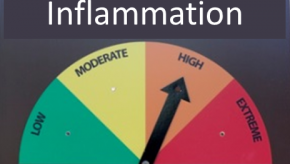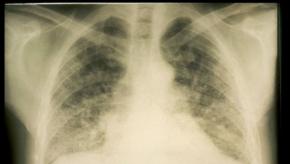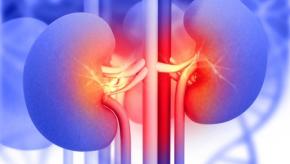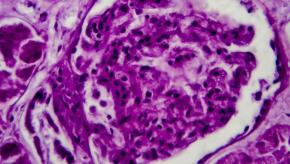All News
2023 ACR/EULAR Antiphospholipid Syndrome Classification Criteria
The American College of Rheumatology (ACR) and EULAR have combined efforts to establish an international multidisciplinary Steering Committee to develop classification criteria for the new antiphospholipid syndrome (APS) to be applied in observational studies and clinical trials.
Read ArticleCardiovascular Disease Precedes ANCA-associated Vasculitis
A nested case–control study from the Danish Nationwide Registries finds an increased risk of cardiovascular (CV) disease in the months preceding diagnosis of ANCA-associated vasculitis (AAV).
Read ArticleManifestations of Systemic Sclerosis Sine Scleroderma
Systemic sclerosis (SSc) sine scleroderma is a unique and rare subset of SSc defined by the absence of skin fibrosis. An analysis of the EUSTAR database suggests systemic disease can be a problem, including interstitial lung disease (>40%) and SSc renal crisis (almost 3%).
Read ArticlePizza and Rheumatoid Arthritis (8.11.2023)
Dr. Jack Cush reviews the news and journal reports from the wonderful wide world of Rheumatology. This week:
Read ArticleBifunctional B-cell Targeted Therapy in IgG4-related Disease
A novel B-cell depletion trial, using obexelimab (a bifunctional, monoclonal antibody that binds CD19 and Fc gamma receptor IIb), has shown efficacy and safety in patients with active IgG4-related disease.
Read ArticleTofacitinib in Polymyalgia Rheumatica (EAST PMR Study)
An open-label, uncontrolled pilot trial has shown that JAK signaling is involved in the pathogenesis of PMR and that tofacitinib is as effective as glucocorticoids (GC) in patients with polymyalgia rheumatica (PMR).
Read ArticleEULAR/ACR Guidance on Haemophagocytic Lymphohistiocytosis/Macrophage Activation Syndrome
A EULAR/American College of Rheumatology task force has established evidence based, up-to-date guidance and expert opinion on the evaluation, management and monitoring of patients with Haemophagocytic lymphohistiocytosis (HLH) and macrophage activation syndrome (MAS), with the primary intent to halt disease progression and prevent life-threatening complications from HLH/MAS.
Read ArticleICYMI: LAVLI - A New Autoinflammatory Disorder
NIH researchers have have described a novel autoinflammatory disorder called "Lyn kinase-associated vasculopathy and liver fibrosis" (LAVLI), based on a mutation in the LYN gene (that encodes the Lyn kinase protein). They discovered that increased Lyn kinase activity promotes systemic inflammation, by altering microvascular permeability and neutrophil recruitment, while at the same time promoting hepatic fibrosis.
Read ArticleScleroderma – Thick and Thin (6.30.2023)
Dr. Jack Cush reviews the news, journal articles and regulatory decisions from the past week from RheumNow.com. This week focuses on parodoxical psoriasis, scleroderma outcomes and subsets, and alopecia areata therapy.
Read ArticleScary Outcomes with Systemic Sclerosis Sine Scleroderma
The hallmark of systemic sclerosis is scleroderma, but less than 10% of SSc patients have sine scleroderma (ssSSc). A EUSTAR database review compared the manifestations and outcomes of ssSSC to limited cutaneous SSc and diffuse cutaneous SSc.
Read ArticlePredictors of Cardiovascular Events in ANCA-Associated Vasculitis
A large, retrospective, multinational study of patients with antineutrophil cytoplasmic antibody (ANCA)-associated vasculitis (AAV) shows they may be at risk for cardiovascular events (CVEs).
Read ArticleTitAIN Study: Secukinumab Efficacy in Giant Cell Arteritis
A phase 2 trial has demonstrated the efficacy of secukinumab, an anti-interleukin-17A monoclonal antibody, in patients with active giant cell arteritis (GCA).
Read ArticleWhat is Colchicine Worth? (6.23.2023)
Dr. Jack Cush reviews the news and reports from the past week on RheumNow.com. This week a new colchicine FDA approval, rising rate of IgG4 related disease and what's the safest biologic?
Read ArticleHow Often Do You Monitor MTX? (6.16.2023)
Dr. Jack Cush reviews the news and journal reports from this past week on RheumNow.com, including new drug approval, a new SpA variant and new rules for methotrexate (MTX) monitoring and depression screening.
Read ArticleHigher Genetic Loads Linked to Worse Systemic Lupus
A Korean study of a large systemic lupus erythematosus (SLE) cohort shows by genomic analysis, that higher weighted genetic risk scores (wGRS) is associated with earlier SLE onset, higher anti–Sm antibody positivity, lupus nephritis and more diverse lupus manifestations.
Read ArticleDiagnostic Yield of Cranial and Large Vessel Imaging in GCA
Combined cranial and large vessel ultrasound and PET/CT provided excellent accuracy for the diagnosis of giant cell arteritis (GCA).
Read ArticleEULAR 2023 – Day 2 Report
Day 2 at the international EULAR Congress meeting is always bigger and busier. There were sessions on JIA therapies, crystal arthritis, novel drugs for SLE and Sjogren's, early RA and preclinical RA interventions, IgG4 disease, osteoporosis and the growth and application of artificial intelligence in medicine and rheumatology.
Read ArticleAOSD: Young vs. Elderly Onset
Adult onset still's disease (AOSD) is an autoinflammatory condition characterized by fevers, arthritis, and rash. It is considered an orphan disease because of its low prevalence - it is reported anywhere between 16 to 40 per ten million.
Read ArticleBelimumab in Lupus Nephritis
Belimumab is a B-lymphocyte stimulator (BLyS)-specific inhibitor that is FDA approved for the treatment of active lupus and lupus nephritis, based on a few pivotal trials; and now a metanalysis supports its use in active lupus nephritis.
Read ArticleHow Age of Onset Affects Giant Cell Arteritis
Giant cell arteritis (GCA) has a different phenotype when diagnosed late in life compared with earlier onset, a large Italian cohort study indicated.
Read Article



















